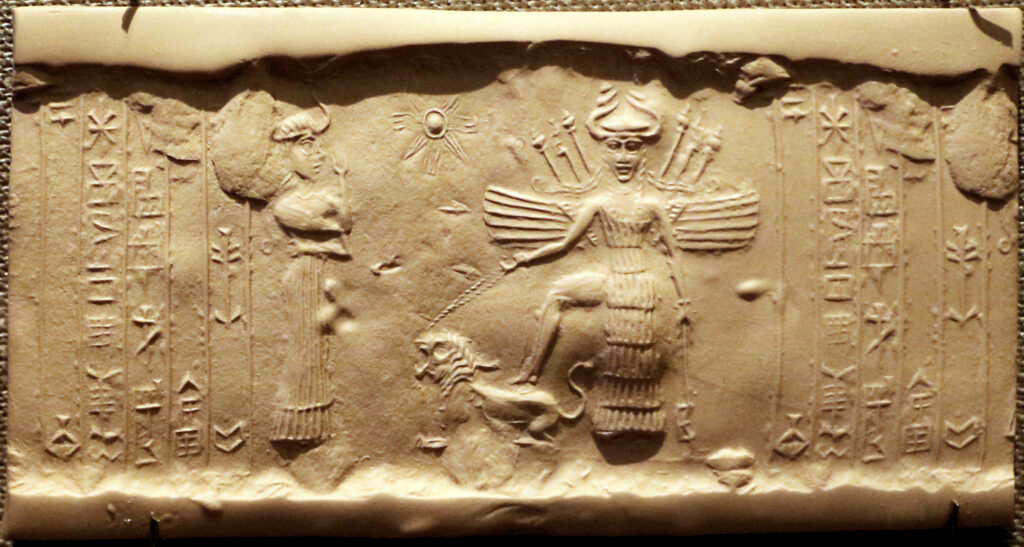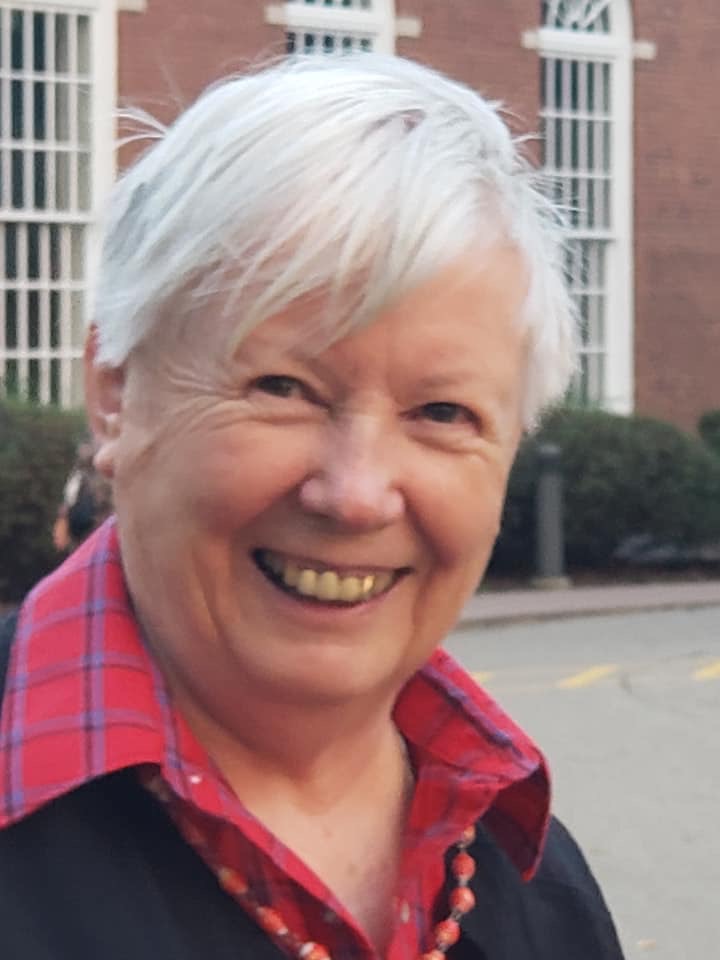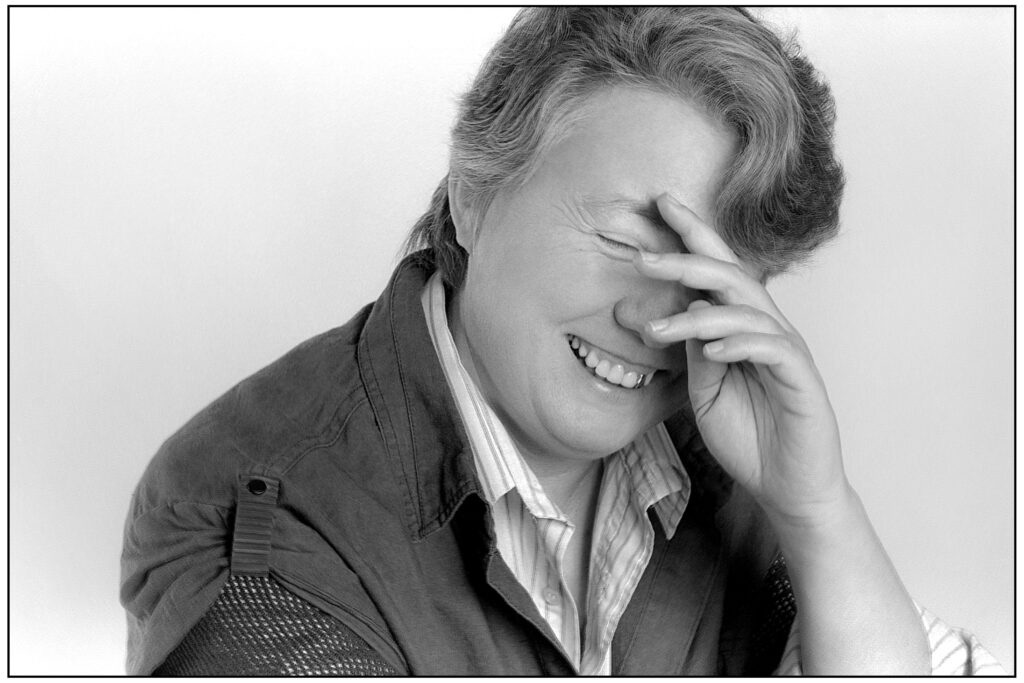In conversation with feminist author Judy Grahn
The poet, author and mythographer provides insight into her fascinating new book, Eruptions of Inanna.
Why is the world so messed up? Well, if you ask a lesbian feminist she’ll simply point to five thousand years of patriarchy. As I was working on this story, Jeff Bezos spent $5.5 billion to be in space for four minutes in a penis-shaped rocket; more of the world was burning, melting and flooding than ever before; the pandemic was dragging on and on; and the un-winnable war in Afghanistan had turned into a blood-soaked coup. These events have occurred at what sometimes feels like the end of human civilization. So when did it all start to go wrong?
Author, myth-historian, and poet Judy Grahn traces the beginnings of our disaster course to ancient Mesopotamia, six thousand years ago in a region that is modern-day Iraq. In Eruptions of Inanna: Justice, Gender and Erotic Power (Nightboat Books), Grahn takes us into a civilization where every city had a temple and a goddess, men and women were equal, nature was respected, and diverse couplings were encouraged and understood. Grahn retells many of the myths featuring the goddess Inanna who presided over the metropolis of Uruk, the center of Sumerian civilization and the largest settlement in the world until Rome. South of this was the city of Ur, where the poet-priestess Enheduanna wrote most of what we know about Inanna — a sexy and sex-positive life force.

Inanna was associated with love, beauty, sex, justice, power, and war. (She was later worshipped by the Akkadians, Babylonians, and Assyrians under the name Ishtar.) In Sumer, women held social and economic power, owned property, ran businesses, and worked as doctors and dentists. Inanna was a goddess who was particularly instructive about how to value natural renewal and human connectedness. Things were looking pretty good in the Fertile Crescent, the Cradle of Civilization (which in today’s purview we simply know as a war zone). But along came Gilgamesh and basically ruined everything with his warrior mentality and toxic masculinity, rejecting Inanna’s focus on female power and ecological responsibility. Twin forces eventually took hold: the hero quest, and the belief that faith-based thought will compensate us for the transgressions and failures of our mortal lives.
I caught up with Grahn to find out a little more about her studies of the sacred feminine.

How old were you when you understood there was power and poetry in understanding mythology and ancient texts?
Judy: At fourteen I learned that acting out lines of Shakespeare was very practical; I used a scene from Romeo and Juliet to court another girl and persuade her to let me kiss her. Much later and more seriously I saw that mythologies fulfill human needs and direct our attention in crucial directions, or they don’t and need to be replaced. Searching, studying, revising, creating—keeps it all meaningful.
Is the Sumerian goddess Inanna about as far back as we can go in trying to locate a time before patriarchy became entrenched?
Judy: Actually, we can go back much further with archeological findings of little goddess stone figures and cave art from tens of thousands of years ago—but having the poetry from more than four thousand years ago is what makes the literature of Inanna so valuable. The poetry of the ancient Sumerians about their deities, including and most especially Inanna and her relatives, is set at the cusp of a turn. From the first centuries of early urbanization at Sumer, whose rivers poured into the Persian Gulf, when women had rights and deities reflective of themselves, their works, and their accomplishments, history then took a turn toward masculine powers of war, empire, industrialization, diminishing of women, and near-disappearance of female deity. I say “near” because there is a revival movement now toward what values of the sacred feminine can teach us about changing ourselves as human beings. Women and young people around the world are stepping up to this task; I also think Inanna’s poets have much to teach us.
Goddess power of course is not entirely absent from the modern world — you mention Beyonce as one of today’s goddesses. Who else do you feel carries woman power?
Judy: BLM founding organizers Patrisse Cullors, Alicia Garza, and Opal Tomet; Greta Thunberg; Alexandria Ocasio-Cortez; Lady Gaga (as shape-shifter); Dolly Parton; Cori Bush sitting in front of congress until the rent moratorium was extended. All the Native women protesting at the oil pipelines, and at sites of Amazon forest clear-cutting.
What is your personal favorite myth from any culture?
Judy: The “Descent Myth of Inanna” remains a rich source of inspiration. I used it for my poetic play The Queen of Swords, set in a lesbian underground bar full of dykes. Another great myth is the Indian “Darikavadham,” a story of female deity (Kali rules!) destroying runaway toxic masculine overreach.
If Eruptions of Inanna could be made into a movie what would the synopsis and tagline be? And who would play Inanna?
Judy: Tagline: “Awaken your inner lion goddess.” Title: “Inanna Blazing Super Shifter.” Synopsis: Inanna the shapeshifter, sometimes a flaming female figure, sometimes a ghost or cat or rainbow, sets out to turn herself into a Burning Power of Justice and Love. On her adventurous path she goes to the forbidden realm, where the Queen of Death strips off Inanna’s ego and kills her. Her second in command and bff tells her grandfather to send help, and he dispatches Inanna’s two transgender cousins, who resurrect her. Now she is stronger, fearlessly honest and relentless in dispensing justice especially to those who don’t respect women or care for the poor, and who are destroying the climate, wildlife, and habitat for everyone. She has the “Eye of Truth.” Unfortunately she has to use this eye on her beloved husband, who was larking it up while she suffered her near-death experience. She tells him he must go into the forbidden realm to replace her, and go through his own resurrection toward common sense. Instead he runs away, first getting the Sun god to turn him into a snake. A gang of thieves then steals all his stuff and kills him. Always protective of nature’s beings, Inanna turns the gang (which is led by a mean old woman) into caretakers of wildlife, including snakes. After a series of confrontations in which she makes love to whoever can please her, she devours the villainy of both women and men piece by piece and turns her capacity to direct the weather toward enhancing life. She leaves us knowing that if we rouse her within ourselves, we can have lives, not that are easy, but that please us.
Starring: Rooney Mara or Jennifer Hudson as younger Inanna. Older Inanna played by Helen Mirren, Nina Simone, Meryl Streep.

As a poet, a PhD, and a Grand Marshall of Pride parades please make a case for why we should be able to keep the words lesbian and dyke as well as queer.
Judy: Lesbian was an unspeakable word when I grew up in the 1950s; as a poet I helped to make it speakable in the 1970s. But I understand that rebellious feeling of being young and hungry for change, and not wanting to be identified with what seems like today’s suburban, clueless, white lesbian couples with not much on their minds except the new car and the wedding plans. At thirty, I didn’t think that middle and upper middle class women could even BE lesbians. (I changed my mind later after meeting some.) And
I’ve always much preferred the word dyke, which continues to be on the “bad word” list despite my attempts to show it means a warrior woman who protects her people from the dreadful empire.
Dyke I traced to a pre-Roman warrior queen in south England in my book Another Mother Tongue: Gay Words, Gay Worlds; I clutch that word to my heart. And butch/femme is an invaluable pair describing the electric polarity that makes sexual tension explode.
All these are English terms with European histories; so is queer, which I included in Another Mother Tongue as simply meaning “not straight.” So much more has surfaced in the last forty years, from all manner of ethnic histories of terms all around the world. I think the English terms also had a sacred base, and my reading of Inanna’s poets adds to this rather exciting idea. By the way, she is life force itself, and if she is not sexually satisfied, good stuff does not happen.
As a poet, I want ALL the words I can get, including Gay and Fairy which used to be used in general for much of our alphabet. I want Lesbian and Sapphic because they relate to Lesbian poetry, a venerable tradition that seems never to go away. And specifically Lesbian sexuality. The poet Sappho herself opened that door by openly expressing her desires, and by calling on her goddess Aphrodite (the Greek version of Inanna) to help her love life. As someone who has lived a long time I can say that when my pals and I were young we changed the language to suit the times we lived in and our various judgements, and then some of us changed it again later. Every generation has its own vocabulary but that’s not the whole of it.
It feels like we live in very troubled times and it can become overwhelming. Any advice on how to cope?
Judy: These are times requiring huge transition, and it can feel overwhelming. However, the problems we face are showing us their character clearly, and so are solutions. A good tactic is to join like-minded groups and feed them more attention than you do to the news whenever it is just bringing you to a place of hopelessness. Also hang out with trees, birds, squirrels. Grow lettuce! Lettuce is an optimistic plant. But what helps me the most is writing and teaching, feeling I am contributing to solutions.
What is the best thing about getting older in general?
Judy: I’m smarter in some ways, more grounded. I’ve had opportunities to develop psychologically and spiritually. I’ve had much more time to sort things out, to learn from others, to investigate, put a bigger story together about myself and about life. My work continues to expand, both outside me and within me, as I can use what I’ve already done as a foundation.
Buy Eruptions of Inanna here.





